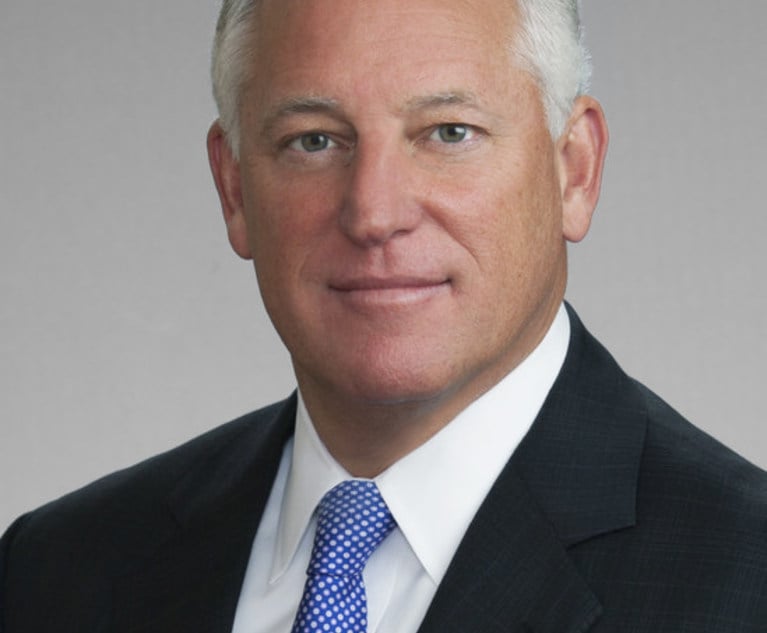 Charles Cooper of Cooper & Kirk at the White House last year. Credit: Diegp M. Radzinschi / NLJ
Charles Cooper of Cooper & Kirk at the White House last year. Credit: Diegp M. Radzinschi / NLJDoug Letter and Chuck Cooper Tangle Over Shield for Lawmakers in House Proxy Voting Suit
Republican members of Congress are suing over proxy voting rules adopted by the House during the pandemic. House lawyers argue the lawsuit has to be thrown out due to protections offered under the Constitution's speech and debate clause.
July 24, 2020 at 06:06 PM
5 minute read
The original version of this story was published on National Law Journal
Attorneys for the House of Representatives and some of its Republican members on Friday argued over whether a shield blocking litigation against lawmakers applied to a lawsuit challenging the chamber's proxy voting rules adopted during the pandemic.
House Republicans, as well as individuals whose members of Congress used the proxy voting system, filed the complaint in May, alleging the system is unconstitutional and lawmakers must be physically present to have their votes count. Otherwise, their attorneys argue, it dilutes the votes of members who do appear in person.
Attorney Charles "Chuck" Cooper reiterated those points during a telephonic hearing before U.S. District Judge Rudolph Contreras on Friday. The GOP members are represented by Cooper's firm, Cooper & Kirk, as well as attorneys with Berke Farah. Firm partner Elliot Berke is outside counsel for House Minority Leader Kevin McCarthy and House Republican Conference Chairwoman Liz Cheney.
On Friday, Cooper pointed out that Congress has never adopted proxy voting rules despite past health crises, such as a yellow fever epidemic in 1793 and the Spanish flu pandemic of 1918. And he read out loud text from the Constitution that invokes the physical presence of the members.
The speech and debate clause, which blocks lawsuits against members of Congress over legislative actions, seems key to the lawsuit. House attorneys for Speaker Nancy Pelosi and other officials, led by House general counsel Douglas Letter, argue the clause forecloses the lawsuit.
Contreras asked Cooper if he were to rule the shield applies, if that's "dispositive, there's nothing left of the case?"
Cooper initially paused before telling Contreras that, if the judge found the protection applied to not just members who approved the proxy voting rules, but also to counting valid votes and to nonmembers involved in the administrative processes of voting, "that's game over."
However, Cooper argued that doing so would result in a blanket ruling that would prevent members of Congress from being able to challenge discriminatory House resolutions, such as one that directed men's votes to be counted twice while only counting women's votes once.
Letter later said Cooper "has a very serious problem" of overcoming the speech and debate shield. "I find it very difficult to think of something that is more central for legislating than voting, and voting by the members of Congress," the House counsel added.
When Contreras asked Letter if Cooper is correct in saying a ruling finding the speech and debate protections apply in this case would prevent members from challenging discriminatory House rules, Letter replied, "I'm not taking that position because I don't have to."
He said there could be cases where the clause would apply, and others where "it may very well be that speech and debate doesn't apply if something is highly discriminatory."
Letter also argued Cooper is incorrect in claiming members who vote on behalf of others are voting multiple times, saying the lawmakers are simply "transmitting the votes," like the electronic voting system or the clerk who tallies the vote totals. Cooper later asserted that those members are in fact only voting once, because any votes they cast for other lawmakers are "invalid."
The lawsuit is one of many pieces of litigation handled by Letter's office. The House, as it has in several other lawsuits, turned to O'Melveny & Myers to assist in the case. Among the partners involved is Michael Dreeben, the former longtime deputy U.S. solicitor general who also served as part of Special Counsel Robert Mueller III's investigation.
At the conclusion of the nearly three-hour hearing, Contreras said he doubts he "will be the last word on this" and said he would issue a decision "as quickly as practicable so I can send everyone on their way."
Contreras also asked Cooper, an alumnus of the University of Alabama, if there was "going to be a quorum in the stadium" when the school's football team returns. Cooper, laughing, said he doubts it.
This is far from the first case Letter and Cooper have argued against each other: Each attorney referred to the other as an "old" or "longtime friend" throughout the hearing.
Cooper and Letter were on opposing sides of a U.S. Supreme Court case on similar claims of dilution of voting power. More recently, Cooper represented Charles Kupperman, a former deputy to ex-national security adviser John Bolton in a challenge over a congressional subpoena issued for Kupperman's testimony in last year's impeachment inquiry. House investigators withdrew the subpoena, and the case—viewed as a proxy of what would happen if a similar subpoena were issued to Bolton—was dismissed.
Letter and Cooper jokingly baited each other ahead of Friday's arguments, after Letter's connection sounded faint on the conference line. After Letter asked if he could be heard, he said, "it feels like I'm yelling at you."
"I'm accustomed to that, Doug," Cooper said, to laughs.
"I don't have your southern gentility," Letter replied.
Read more:
This content has been archived. It is available through our partners, LexisNexis® and Bloomberg Law.
To view this content, please continue to their sites.
Not a Lexis Subscriber?
Subscribe Now
Not a Bloomberg Law Subscriber?
Subscribe Now
NOT FOR REPRINT
© 2024 ALM Global, LLC, All Rights Reserved. Request academic re-use from www.copyright.com. All other uses, submit a request to [email protected]. For more information visit Asset & Logo Licensing.
You Might Like
View All
More Big Law Firms Rush to Match Associate Bonuses, While Some Offer Potential for Even More

Dog Gone It, Target: Provider of Retailer's Mascot Dog Sues Over Contract Cancellation
4 minute read
In Talc Bankruptcy, Andy Birchfield Skipped His Deposition. Could He Face Sanctions?
6 minute read
GC Conference Takeaways: Picking AI Vendors 'a Bit of a Crap Shoot,' Beware of Internal Investigation 'Scope Creep'
8 minute readLaw Firms Mentioned
Trending Stories
Who Got The Work
Michael G. Bongiorno, Andrew Scott Dulberg and Elizabeth E. Driscoll from Wilmer Cutler Pickering Hale and Dorr have stepped in to represent Symbotic Inc., an A.I.-enabled technology platform that focuses on increasing supply chain efficiency, and other defendants in a pending shareholder derivative lawsuit. The case, filed Oct. 2 in Massachusetts District Court by the Brown Law Firm on behalf of Stephen Austen, accuses certain officers and directors of misleading investors in regard to Symbotic's potential for margin growth by failing to disclose that the company was not equipped to timely deploy its systems or manage expenses through project delays. The case, assigned to U.S. District Judge Nathaniel M. Gorton, is 1:24-cv-12522, Austen v. Cohen et al.
Who Got The Work
Edmund Polubinski and Marie Killmond of Davis Polk & Wardwell have entered appearances for data platform software development company MongoDB and other defendants in a pending shareholder derivative lawsuit. The action, filed Oct. 7 in New York Southern District Court by the Brown Law Firm, accuses the company's directors and/or officers of falsely expressing confidence in the company’s restructuring of its sales incentive plan and downplaying the severity of decreases in its upfront commitments. The case is 1:24-cv-07594, Roy v. Ittycheria et al.
Who Got The Work
Amy O. Bruchs and Kurt F. Ellison of Michael Best & Friedrich have entered appearances for Epic Systems Corp. in a pending employment discrimination lawsuit. The suit was filed Sept. 7 in Wisconsin Western District Court by Levine Eisberner LLC and Siri & Glimstad on behalf of a project manager who claims that he was wrongfully terminated after applying for a religious exemption to the defendant's COVID-19 vaccine mandate. The case, assigned to U.S. Magistrate Judge Anita Marie Boor, is 3:24-cv-00630, Secker, Nathan v. Epic Systems Corporation.
Who Got The Work
David X. Sullivan, Thomas J. Finn and Gregory A. Hall from McCarter & English have entered appearances for Sunrun Installation Services in a pending civil rights lawsuit. The complaint was filed Sept. 4 in Connecticut District Court by attorney Robert M. Berke on behalf of former employee George Edward Steins, who was arrested and charged with employing an unregistered home improvement salesperson. The complaint alleges that had Sunrun informed the Connecticut Department of Consumer Protection that the plaintiff's employment had ended in 2017 and that he no longer held Sunrun's home improvement contractor license, he would not have been hit with charges, which were dismissed in May 2024. The case, assigned to U.S. District Judge Jeffrey A. Meyer, is 3:24-cv-01423, Steins v. Sunrun, Inc. et al.
Who Got The Work
Greenberg Traurig shareholder Joshua L. Raskin has entered an appearance for boohoo.com UK Ltd. in a pending patent infringement lawsuit. The suit, filed Sept. 3 in Texas Eastern District Court by Rozier Hardt McDonough on behalf of Alto Dynamics, asserts five patents related to an online shopping platform. The case, assigned to U.S. District Judge Rodney Gilstrap, is 2:24-cv-00719, Alto Dynamics, LLC v. boohoo.com UK Limited.
Featured Firms
Law Offices of Gary Martin Hays & Associates, P.C.
(470) 294-1674
Law Offices of Mark E. Salomone
(857) 444-6468
Smith & Hassler
(713) 739-1250








